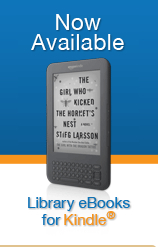Penguin Kindle Title Restoration is Temporary
Thursday, November 24th, 2011After OverDrive’s announcement that Penguin had decided to restore access to older titles for library lending via Kindle, Penguin released a statement that this will only be in effect through the end of the year, unless concerns about unnamed security issues are resolved (see last line)
Penguin USA took the decision yesterday [11/22] to withhold the supply of new digital titles from suppliers to US libraries until concerns about the security of the copyright of its authors have been resolved.
In addition, Penguin informed suppliers to libraries that it expected them to abide by existing agreements to offer older digital titles to libraries only if those files were held behind the firewalls of the suppliers.
Following receipt of this information, Overdrive, a supplier of ebooks to US libraries, removed “Get for Kindle” from its offering.
Penguin has subsequently been informed by Amazon that it had not been consulted by Overdrive about the terms of Penguin’s agreement with Overdrive. Amazon has undertaken to work with Penguin and Overdrive between now and the end of the year to address Penguin’s concerns. Penguin will, as a result, restore the supply of these titles until the end of the year in order to return the availability of older titles to all its digital customers.



